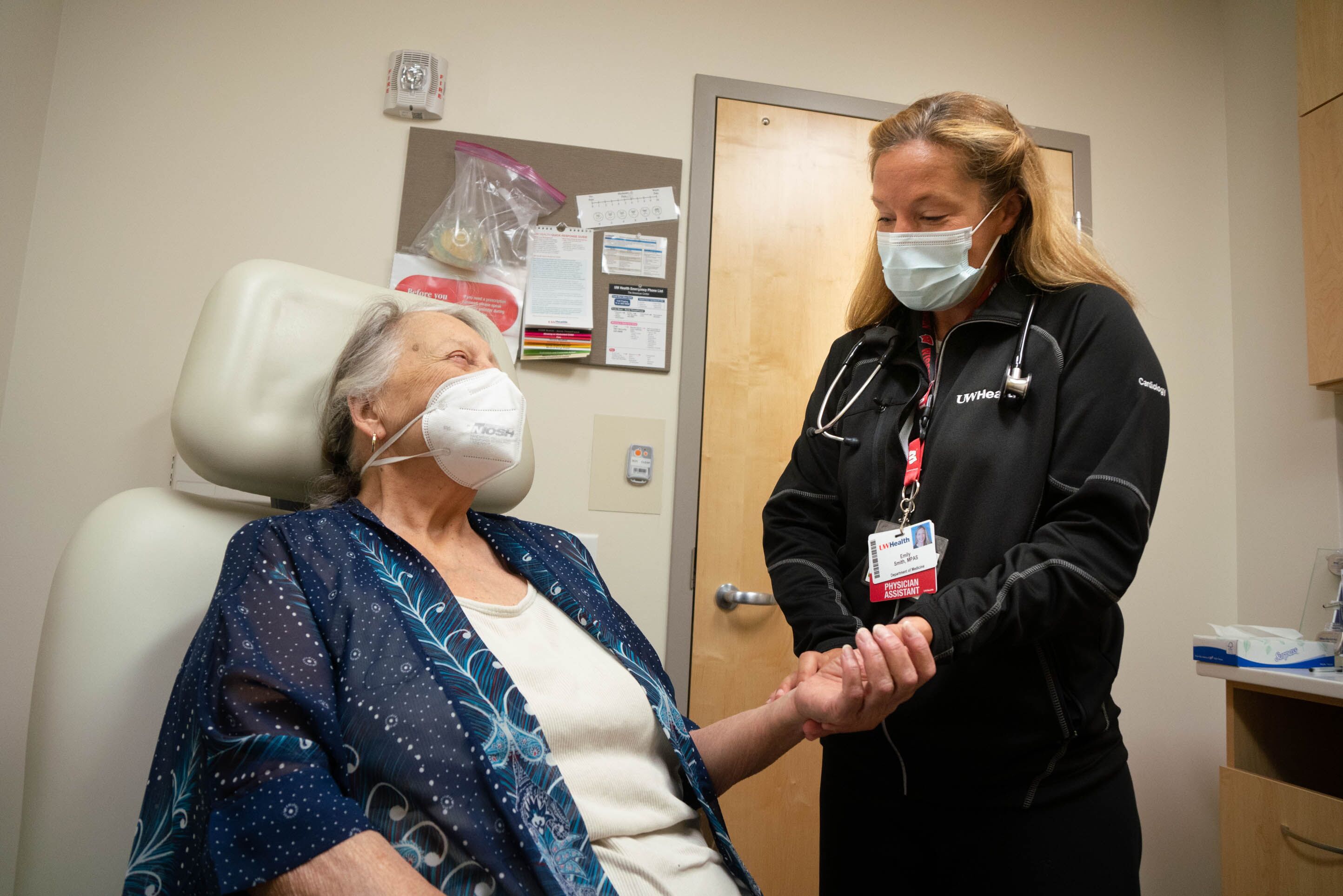
APP Spotlight: Emily Smith, Physician Assistant, Cardiovascular Medicine; East Madison Hospital
Tell us about yourself.
I’ve been a physician assistant for 15 years but just started with UW Health in February of this year. Prior to that, I was in emergency medicine. I loved the emergency room, but the schedule made it hard to maintain balance with my home life as my kids get older and more involved with school and sports. It’s been quite a leap to go from emergency medicine to a clinical subspecialty but I’m loving it so far. The normal sleep schedule isn’t too shabby either.
Where did you grow up?
I grew up in Fort Atkinson, Wisconsin. I completed my undergraduate degree at the University of Wisconsin-Stevens Point, studied abroad in Australia, and then attended the University of Wisconsin School of Medicine and Public Health in the Physician Assistant Program. I now live in Sauk Prairie with my family.
Tell us about your family.
My husband and I have two kids, a 10-year-old daughter and a 9-year-old son. We tend to spend our free time in the woods or on the water, trying to squeeze as much summer out of Wisconsin as we can with wake surfing, kiteboarding and foiling.
How did you come to UW Health?
When I was looking to transition out of emergency medicine, I wanted something that would not only allow me to be more present for night/weekend activities with my family, but also something I genuinely had a passion to learn. I had a reputation as a bit of an “EKG nerd” in the emergency room, and have always been fascinated by cardiac physiology, so the electrophysiology position seemed like a great fit. I was also drawn to the fact that it’s an academic hospital. I love learning and teaching, and there is never a shortage of opportunities for either.
What inspires you about your profession?
I am grateful that the advanced practice provider (APP) profession allows me to carry my love for teaching to the bedside. Helping patients understand their condition aids them in taking ownership of their own health. It allows them to be a part of the decision-making process instead of just a bystander living with a diagnosis. We see many patients with atrial fibrillation (Afib) in clinic, and this dysrhythmia can be significantly impacted by lifestyle modifications, an area of medicine that has piqued my interest the last few years. Counseling patients on medication, procedural options and everyday lifestyle decisions puts some of the control back in their hands. It is gratifying to follow these patients as they implement modifications and then see the changes translate into better quality of life.
Do you have a memorable experience in your career that has stayed with you?
Since nearly all my career thus far has been spent in the emergency room, most of my memorable moments are there. Even though I can recall plenty of patients due to the severity of their trauma or illness, some of the connections that are most memorable are with family members. I worked at some smaller rural emergency rooms where we didn’t have a large team at our disposal, so oftentimes once a code was up and running, I would then be responsible for gathering more information from family and talking them through the code. It’s an incredibly raw and vulnerable time, usually the worst day of their life, and it’s important that they feel informed and connected to what’s happening to their loved one.
A patient’s wife wrote me the nicest letter after her husband had coded, saying I was the one person she and her kids remembered from the whole experience. They live out of town and one of her children asked if I could come back once their dad was an inpatient at a hospital closer to home.
Although I’m still quite new to the electrophysiology team, some of my most memorable clinic experiences are post-procedure follow up visits. They tend to be straightforward, but they are far from mundane. Whether it’s an ablation or placement of a device, patients come back to the clinic eager to share with me all that they’ve been able to return to gardening, cycling, playing with their kids/grandkids, all without the limitations of their dysrhythmia. Hearing patients’ gratitude and seeing their motivation never gets old.
What have your patients taught you about yourself?
My patients have taught me to be a better listener. I can sometimes get a little overzealous about the science and pathophysiology of it all, but patients don’t always share that same intrigue. Oftentimes, and understandably so, they just want to know how a particular condition or procedure is going to impact them, their family, hobbies and daily life. Through my years of experience, I’ve come to recognize the importance of meeting patients where they are. I listen to their concerns and goals of care, and then providing education that is specific to their unique situation.
In a few words, how would you describe your coworkers and team at UW Health?
Brilliant. Welcoming. Driven. Electrophysiology is a complex field, and coming in as the newbie, I’ve asked a ridiculous number of questions. The APP team, doctors, electrophysiology nurses, device nurses and cardiology APPs at large have all been so gracious with their patience and willingness to teach. It’s both inspiring and humbling to be affiliated with this team.
Outside of work, what did you accomplish this year that makes you proud?
I learned how to drive a Zamboni! I have a hunch you were looking for something different from that question, but driving a Zamboni is pretty rad.
